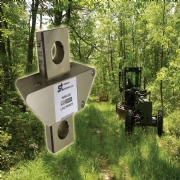 Add My Company
Add My Company
Sign In
Technology transfer tests tree safety
03-02-2011

Highway engineers and horticulturalists have adapted the latest in helicopter technology to solve a critical safety problem in their own industries, tree viability.
Trees can transform a roadside verge, townscape or recreation space with their beauty and their ability to capture carbon dioxide. But they also present a potential hazard: if they fall, they could block a vital highway or even kill someone.
As a result, professionals responsible for trees like to test the strength of their roots, usually by fixing a sling around the trunk and giving it a good tug with a tractor!
“This procedure lacks some finesse,” says Tony Ingham of Sensor Technology, who has been working on ways to improve the technique.
“The basic idea is to put a strain gauge in line with the sling, then convert the readout from Newtons to a wind speed equivalent. This is perfectly achievable, but the concept needs refining to make it attractive enough to become widely adopted.”
The tractor crews will not want to spend time setting up instruments, taking readings, recording them and then set about making complex calculations. If they can’t rope up a tree, give it a pull and move onto the next one in a matter of minutes, they won’t be interested.
Sensor Technology realised that they had the solution to this with their LoadSense range. Tony Ingham continues: “This is actually an intelligent cargo hook for helicopter pilots who need to underslung carry loads. This may seem like a different world, but the concept is that the hook has on-board electronics for measuring the load and a wireless transmitter for sending the live data to a nearby ruggedised PC or custom built handheld readout.
We replaced the hook with one more suited to the tree work, recalibrated the strain gauge and wrote some software appropriate to the job in hand. The procedure with our equipment is to pull the tree until the first suggestions of movement, with the load force being automatically displayed as wind speed and a pass/fail signal.”
In the second stage of calculation, the software can use a look-up table to suggest how often such as wind is likely to be experienced. Tony says that for a future development Sensor Technology is talking to the Met Office about using their wind maps of the UK along with GPS (global positioning system) readings to produce results almost to the individual tree:
“All the data handling and calculations are transparent to the crew, they get simple pass/fail reading. But the data can be stored and further resolved into high level management information which will help with developing long-term maintenance programmes.”
For more information on Technology transfer tests tree safety talk to Sensor Technology Ltd
Enquire Now
List your company on FindTheNeedle.

